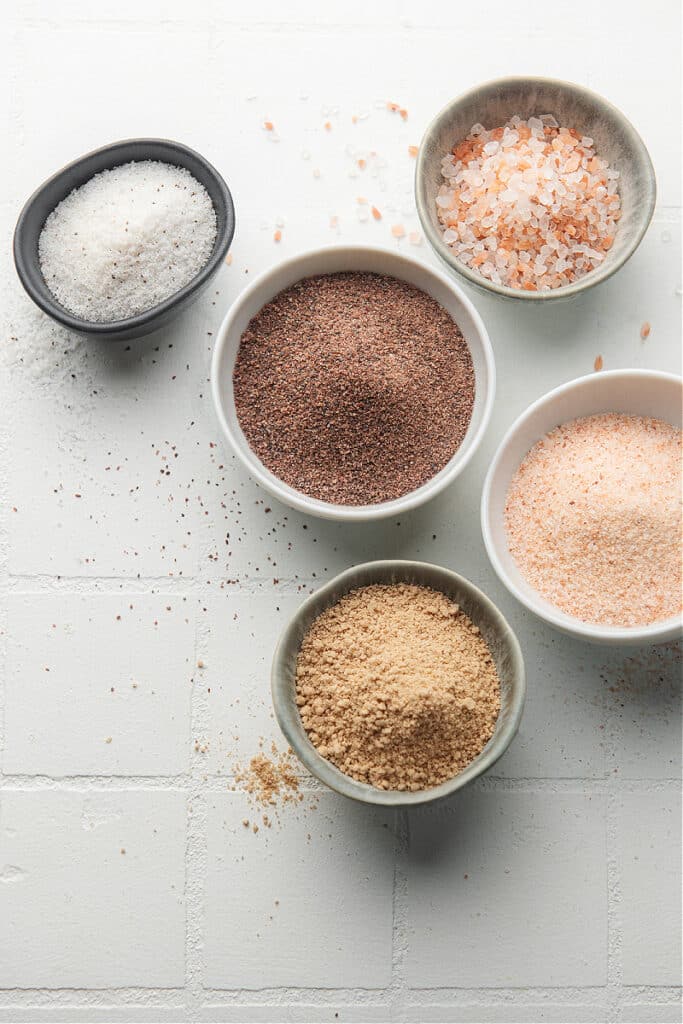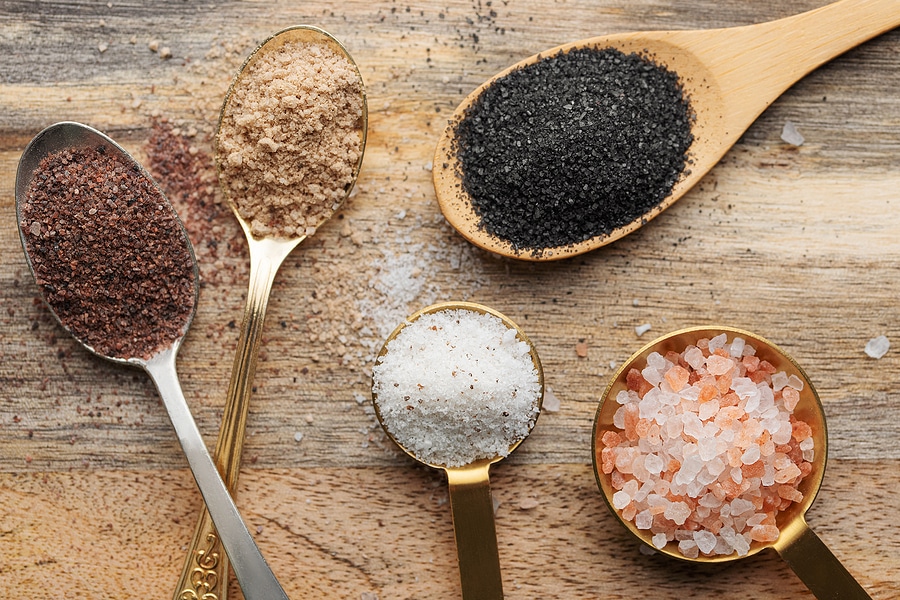Have you ever wondered exactly what are electrolytes or minerals, and how are they related (if at all!)?
You’re not alone! I get questions all of the time regarding electrolytes and minerals and how to keep them balanced.
You’ve likely heard the term “electrolytes” thrown around, especially when it comes to hydration. And you’ve probably heard of the importance of minerals, in particular the more commonly discussed minerals like calcium and magnesium.
The truth is, electrolytes are important for so many things beyond keeping you hydrated. And there are so many more minerals beyond calcium and magnesium, many of which are equally important and have multi-faceted responsibilities.
Let’s dive in!
 What is a mineral?
What is a mineral?
A mineral is an inorganic, or nonliving, substance found in soil and water. Our bodies cannot naturally produce minerals, but we need many of them for survival. Therefore, we must rely on our diet to provide the minerals we need.
Essential versus Nonessential Minerals:
Minerals can be classified as either essential or nonessential.
There are hundreds of minerals, and to list all of the essential and nonessential minerals would be much too long of a list for this article.
Essential Minerals are specific minerals nutritional scientists believe to be essential for our survival and proper functioning. While not everyone agrees on exactly which minerals should or shouldn’t be included on the “essential list,” some of the more common essential minerals include: calcium, chromium, phosphorus, potassium, sodium, chloride, magnesium, iron, zinc, iodine, sulfur, cobalt, copper, manganese, molybdenum and selenium.
Nonessential Minerals are those minerals which are not considered necessary for bodily health and survival. Some non-essential minerals include: aluminum, arsenic, bromine, cadmium and barium.
Macro versus Trace Minerals:
Minerals can also be classified as macro or trace minerals. There are no exact, agreed-upon numbers or constraints that form a strict boundary between macro or trace minerals.
In general, the estimated dietary need for macro minerals is 100 milligrams or more per day. While the estimated dietary need for trace minerals is less than 100 milligrams per day.
Macro minerals are minerals which are needed in larger amounts in the body. They include calcium, phosphorus, magnesium, sodium, potassium, chloride and sulfur.
Trace minerals are needed in much smaller amounts in the body. They include minerals such as: boron, chromium, cobalt, germanium, iron, manganese, molybdenum, copper, iodine, zinc, silicon, vanadium and selenium.
Now that we’ve established what minerals are, what exactly are electrolytes?
“Electrolyte” is simply the umbrella term for a substance that conducts an electrical current when suspended in a liquid. That electrical current can either be positively or negatively charged.
Electrically charged molecules, or ions, are found both within the cellular fluid and outside of the cellular fluid in our blood, urine, sweat and other bodily fluids. Electrolytes can also be found in the fluid of sports drinks and other beverages.
Most all electrolytes are minerals, but not all minerals are electrolytes. For example, sodium found in a sports drink would be both a mineral and an electrolyte, as it is electrically charged. But calcium that is found in a food would be only a mineral (not an electrolyte), as it is bound to other elements in the food and not electrically charged.
In short, electrolytes are ionized, or charged, minerals. Electrolytes are minerals, but not all minerals are electrolytes.
What are examples of some of the more common electrolytes our bodies need?
Some electrolytes include:
- Sodium
- Calcium
- Potassium
- Chloride
- Phosphorus
- Magnesium
Notice that all of those electrolytes are both essential minerals (we need them for proper functioning and survival) and macro minerals (we need them in larger amounts in the body).
But why do we need these electrolytes? What do they do for our body?
About 60% of the human body is water. And as we said earlier, almost every fluid in the body contains electrolytes.
These electrically charged particles conduct electrical charges within our bodily fluid, creating chemical reactions. The chemical reactions result in such things as nerve impulses, muscle contractions and the balancing of fluids inside and outside of cells.
Electrolytes regulate the chemical reactions in our body, including hydration, pH balance, muscular function, nerve function and more.
We intake electrolytes through what we eat and drink. We excrete electrolytes via the kidneys (through our urine) as well as when we sweat.
Without proper levels of electrolytes in the body, we’d cease to be able to use our muscles and nerves, maintain proper hydration, keep balance within the blood and more.
What depletes the body’s minerals?
Stress is the main problem I see behind low mineral levels.
Stress lowers stomach acid. When stomach acid is low, it can’t properly break down the food we eat. When food is not broken down, our bodies can’t absorb the minerals and nutrients from them.
This is one reason why I preach about the importance of eating in a slow and relaxed state. You will absorb more minerals from your food if you eat slowly, allowing stomach acid to properly break down your food.
What are some signs and symptoms of electrolyte imbalance in the body?
- irregular heartbeat
- weakness
- muscle spasms and twitches
- dysregulation of blood pressure
- fatigue
- numbness
- delirium and confusion
- bone density problems and disorders
- nervous system disorders
- seizures and convulsions
What are good sources of electrolytes?
Most of us immediately think “sports drinks!” when we’re considering the best sources of electrolytes. But we should definitely think again.
Most sports drinks are laden with added sugars, food colorings and other less than optimal ingredients. The benefit of the electrolytes we would consume in those drinks is definitely not worth the downside of their other ingredients.
According to Weston A. Price Foundation, the best way to take in minerals is through mineral-rich water, nutrient-dense foods and beverages and mineral-rich bone broths.
As with most nutrients, the best way to obtain electrolytes is in naturally-occurring, whole-food form.
Some excellent sources of electrolytes include:
As you can see, sufficient electrolyte intake is crucial for so many metabolic processes within the body. From balancing blood pH to balancing hydration, electrolytes are instrumental for good health.
But we shouldn’t fall prey to marketing that makes us believe the only way to get our electrolytes is through sugary, artificial drinks.
Traditional, whole-food sources are the best way to eat + drink for our health, whether to obtain the vitamins or minerals, including those essential electrolytes!



